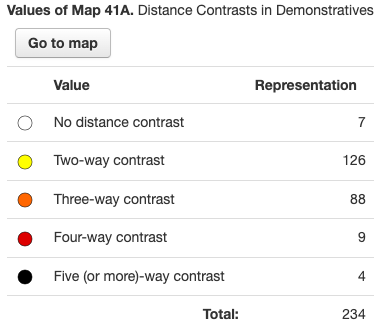This 'n that
Language Log 2024-12-14
A recent Elle Cordova short:
Many aspects of this skit deserve linguistic analysis — I'll focus on on two aspects:
- The semantic step from literal "this and that", referring to two specific things, to an expression that Wiktionary glosses as referring to "various unspecified things".
- The cross-linguistic variation in degrees of distance contrast in demonstratives.
WRT point (1), Wiktionary has no pages for ceci et cela or dit en dat or dies und das or esto y aquello — I'm not clear whether that's because the expressions are less (or not at all) colloquial in French and Dutch and German and Spanish etc., or just because those Wiktionary sections are less populated. Certainly a few examples can be found on line, e.g. the name of a grocery store in Toulouse… Reactions from readers will be appreciated, extending to whatever other languages you know.
There's a passage in St. Augustine's Confessions suggesting that a version of the analogous idiom existed in 4th century Latin:
(26) Retinebant nugae nugarum et vanitates vanitantium, antiquae amicae meae, et succutiebant vestem meam carneam et submurmurabant, “dimittisne nos?” et “a momento isto non erimus tecum ultra in aeternum” et “a momento isto non tibi licebit hoc et illud ultra in aeternum.” et quae suggerebant in eo quod dixi “hoc et illud,” quae suggerebant, deus meus, avertat ab anima servi tui misericordia tua! quas sordes suggerebant, quae dedecora! et audiebam eas iam longe minus quam dimidius, non tamquam libere contradicentes eundo in obviam, sed velut a dorso mussitantes et discedentem quasi furtim vellicantes, ut respicerem. tardabant tamen cunctantem me abripere atque excutere ab eis et transilire quo vocabar, cum diceret mihi consuetudo violenta, “putasne sine istis poteris?”
(27) Sed iam tepidissime hoc dicebat. aperiebatur enim ab ea parte qua intenderam faciem et quo transire trepidabam casta dignitas continentiae, serena et non dissolute hilaris, honeste blandiens ut venirem neque dubitarem, et extendens ad me suscipiendum et amplectendum …
(26) My old friends, utter frivolity and complete vanity, were restraining me. Beneath my garment of flesh they were pinching me gently and whispering softly, “Are you going to send us away?” and, “from that moment we shall no longer be with you forever” and, “from that moment you will not be allowed to do such and such ever again.” As for the things they were reminding me of, in that “such and such” I just referred to, what they were reminding me of, O my God, let your mercy turn it aside from the soul of your servant! What filth, what shame they were reminding me of! I was not even half-listening to them, and they no longer argued with me in an open attack. Instead they were grumbling behind my back and, as it were, furtively nagging me, even as I was abandoning them, to look back. They slowed me down as I hesitated to snatch myself away from them and shake them off, and to make the leap to where I was being called; for my impetuous habits kept calling to me, “Do you think you can cope without those things?”
(27) But that call of habit was now barely lukewarm, for from the direction where I had turned my face, and where I trembled to move across, there appeared the pure excellence of Chastity. She was tranquil rather than carelessly merry, she was frankly coaxing me to come on and not hesitate, she held out holy hands to support me …
(English translation by Carolyn J.-B. Hammond. It seems to me that "this and that" would work as well as "such and such" to translate Augustine's "hoc et illud", but the general idea is clear either way.)
Moving on to point (2), we note that the World Atlas of Language Structures distinguishes at least five type of "Distance Contrasts in Demonstratives":
I have some personal experience with one four-way contrast language, namely Somali, based on a field-methods course from which I took a simple morphology exercise for ling001 (see section 3(b)…). But I don't know whether Somali has a way of combining some of these demonstratives to make an idiom meaning "various unspecified things".
